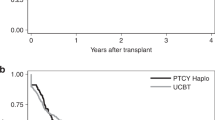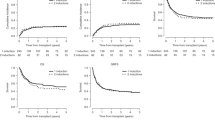Abstract
Suboptimal neutrophil and platelet recovery after unrelated donor umbilical cord blood transplantation (UCBT) may be due in part to an impaired microenvironment after intensive chemoradiotherapy. In an attempt to speed hematopoietic recovery, 15 pediatric patients with high-risk acute leukemia were enrolled on a single-institution phase I–II clinical trial in which ex-vivo culture-expanded MSCs from haploidentical parental donors were infused at the time of UCBT. Eight patients received MSCs on day 0, with three patients having a second dose infused on day 21. No serious adverse events were observed with any MSC infusion. All eight evaluable patients achieved neutrophil engraftment at a median of 19 days. Probability of platelet engraftment was 75%, at a median of 53 days. With a median follow-up of 6.8 years, five patients remain alive and disease free. The results of this pilot study show that infusion of ex-vivo culture-expanded haploidentical MSCs into unrelated pediatric UCBT recipients can be performed safely. This encouraging safety profile with haploidentical MSCs supports the investigation of unrelated ‘off the shelf’ allogeneic HLA-mismatched MSC products.
This is a preview of subscription content, access via your institution
Access options
Subscribe to this journal
Receive 12 print issues and online access
$259.00 per year
only $21.58 per issue
Buy this article
- Purchase on Springer Link
- Instant access to full article PDF
Prices may be subject to local taxes which are calculated during checkout



Similar content being viewed by others
References
Deryugina EI, Muller-Sieburg CE . Stromal cells in long-term cultures: keys to the elucidation of hematopoietic development? Crit Rev Immunol 1993; 13: 115–150.
Dorshkind K . Regulation of hemopoiesis by bone marrow stromal cells and their products. Annu Rev Immunol 1990; 8: 111–137.
Ashton BA, Allen TD, Howlett CR, Eaglesom CC, Hattori A, Owen M . Formation of bone and cartilage by marrow stromal cells in diffusion chambers in vivo. Clin Orthop Relat Res 1980; 151: 294–307.
Beresford JN . Osteogenic stem cells and the stromal system of bone and marrow. Clin Orthop Relat Res 1989; 240: 270–280.
Bab I, Passi-Even L, Gazit D, Sekeles E, Ashton BA, Peylan-Ramu N et al. Osteogenesis in in vivo diffusion chamber cultures of human marrow cells. Bone Miner 1988; 4: 373–386.
Verfaillie CM . Direct contact between human primitive hematopoietic progenitors and bone marrow stroma is not required for long-term in vitro hematopoiesis. Blood 1992; 79: 2821–2826.
Choudhury C . Role of the microenvironment on hematopoiesis. I. Stem cell differentiation into granulocytic and megakaryocytic cell lineage. J Lab Clin Med 1989; 114: 378–381.
Harigaya K, Handa H . Generation of functional clonal cell lines from human bone marrow stroma. Proc Natl Acad Sci USA 1985; 82: 3477–3480.
Gordon MY, Clarke D, Atkinson J, Greaves MF . Hemopoietic progenitor cell binding to the stromal microenvironment in vitro. Exp Hematol 1990; 18: 837–842.
Cheng L, Mbalaviele G, Liu X . Human mesenchymal stem cell support proliferation and multilineage differentiation of human hematopoietic stem cells. Blood 1998; 92: 57a.
Rubinstein P, Carrier C, Scaradavou A, Kurtzberg J, Adamson J, Migliaccio AR et al. Outcomes among 562 recipients of placental-blood transplants from unrelated donors. N Engl J Med 1998; 339: 1565–1577.
Barker JN, Davies SM, DeFor T, Ramsay NK, Weisdorf DJ, Wagner JE . Survival after transplantation of unrelated donor umbilical cord blood is comparable to that of human leukocyte antigen-matched unrelated donor bone marrow: results of a matched-pair analysis. Blood 2001; 97: 2957–2961.
Wagner JE, Barker JN, DeFor TE, Baker KS, Blazar BR, Eide C et al. Transplantation of unrelated donor umbilical cord blood in 102 patients with malignant and nonmalignant diseases: influence of CD34 cell dose and HLA disparity on treatment-related mortality and survival. Blood 2002; 100: 1611–1618.
Rice A, Reiffers J, Bernard P, Foures C, Bascans E, Lacombe F et al. Incomplete stroma formation after allogeneic marrow or autologous blood stem cell transplantation. Nouv Rev Fr Hematol 1992; 34: 167–174.
Novitzky N, Mohamed R . Alterations in both the hematopoietic microenvironment and the progenitor cell population follow the recovery from myeloablative therapy and bone marrow transplantation. Exp Hematol 1995; 23: 1661–1666.
Scharf SJ, Smith AG, Hansen JA, McFarland C, Erlich HA . Quantitative determination of bone marrow transplant engraftment using fluorescent polymerase chain reaction primers for human identity markers. Blood 1995; 85: 1954–1963.
Schichman SA, Suess P, Vertino AM, Gray PS . Comparison of short tandem repeat and variable number tandem repeat genetic markers for quantitative determination of allogeneic bone marrow transplant engraftment. Bone Marrow Transplant 2002; 29: 243–248.
Haynesworth SE, Baber MA, Caplan AI . Cytokine expression by human marrow-derived mesenchymal progenitor cells in vitro: effects of dexamethasone and IL-1 alpha. J Cell Physiol 1996; 166: 585–592.
Pittenger MF, Mackay AM, Beck SC, Jaiswal RK, Douglas R, Mosca JD et al. Multilineage potential of adult human mesenchymal stem cells. Science 1999; 284: 143–147.
Ringden O, Uzunel M, Rasmusson I, Remberger M, Sundberg B, Lonnies H et al. Mesenchymal stem cells for treatment of therapy-resistant graft-versus-host disease. Transplantation 2006; 81: 1390–1397.
Le Blanc K, Samuelsson H, Gustafsson B, Remberger M, Sundberg B, Arvidson J et al. Transplantation of mesenchymal stem cells to enhance engraftment of hematopoietic stem cells. Leukemia 2007; 21: 1733–1738.
Koc ON, Gerson SL, Cooper BW, Dyhouse SM, Haynesworth SE, Caplan AI et al. Rapid hematopoietic recovery after coinfusion of autologous-blood stem cells and culture-expanded marrow mesenchymal stem cells in advanced breast cancer patients receiving high-dose chemotherapy. J Clin Oncol 2000; 18: 307–316.
Fouillard L, Bensidhoum M, Bories D, Bonte H, Lopez M, Moseley AM et al. Engraftment of allogeneic mesenchymal stem cells in the bone marrow of a patient with severe idiopathic aplastic anemia improves stroma. Leukemia 2003; 17: 474–476.
Lee ST, Jang JH, Cheong JW, Kim JS, Maemg HY, Hahn JS et al. Treatment of high-risk acute myelogenous leukaemia by myeloablative chemoradiotherapy followed by co-infusion of T cell-depleted haematopoietic stem cells and culture-expanded marrow mesenchymal stem cells from a related donor with one fully mismatched human leucocyte antigen haplotype. Br J Haematol 2002; 118: 1128–1131.
Lazarus HM, Koc ON, Devine SM, Curtin P, Maziarz RT, Holland HK et al. Cotransplantation of HLA-identical sibling culture-expanded mesenchymal stem cells and hematopoietic stem cells in hematologic malignancy patients. Biol Blood Marrow Transplant 2005; 11: 389–398.
Caplan AI . Adult mesenchymal stem cells for tissue engineering versus regenerative medicine. J Cell Physiol 2007; 213: 341–347.
Cilloni D, Carlo-Stella C, Falzetti F, Sammarelli G, Regazzi E, Colla S et al. Limited engraftment capacity of bone marrow-derived mesenchymal cells following T-cell-depleted hematopoietic stem cell transplantation. Blood 2000; 96: 3637–3643.
Le Blanc K, Frassoni F, Ball L, Lanino E, Sundberg B, Lonnies H et al. Mesenchymal stem cells for treatment of severe acute graft-versus-host disease. Blood 2006; 108: 226a.
Ball LM, Bernardo ME, Roelofs H, Lankester A, Cometa A, Egeler RM et al. Co-transplantation of ex vivo expanded mesenchymal stem cells accelerates lymphocyte recovery and may reduce the risk of graft failure in haploidentical hematopoietic stem cell transplantation. Blood 2007; 110: 2764–2767.
Poloni A, Leoni P, Buscemi L, Balducci F, Pasquini R, Masia MC et al. Engraftment capacity of mesenchymal cells following hematopoietic stem cell transplantation in patients receiving reduced-intensity conditioning regimen. Leukemia 2006; 20: 329–335.
Acknowledgements
This study was sponsored by Osiris Therapeutics, Inc.
Author information
Authors and Affiliations
Corresponding author
Rights and permissions
About this article
Cite this article
MacMillan, M., Blazar, B., DeFor, T. et al. Transplantation of ex-vivo culture-expanded parental haploidentical mesenchymal stem cells to promote engraftment in pediatric recipients of unrelated donor umbilical cord blood: results of a phase I–II clinical trial. Bone Marrow Transplant 43, 447–454 (2009). https://doi.org/10.1038/bmt.2008.348
Received:
Revised:
Accepted:
Published:
Issue Date:
DOI: https://doi.org/10.1038/bmt.2008.348
Keywords
This article is cited by
-
CD14 positive cells accelerate hematopoietic stem cell engraftment
Bone Marrow Transplantation (2022)
-
Efficacy and safety of mesenchymal stem cells co-infusion in allogeneic hematopoietic stem cell transplantation: a systematic review and meta-analysis
Stem Cell Research & Therapy (2021)
-
Influence of the mesenchymal stromal cell source on the hematopoietic supportive capacity of umbilical cord blood-derived CD34+-enriched cells
Stem Cell Research & Therapy (2021)
-
Intrabone infusion for allogeneic umbilical cord blood transplantation in children
Bone Marrow Transplantation (2021)
-
Mesenchymal stromal cells for the prophylaxis and treatment of graft-versus-host disease—a meta-analysis
Stem Cell Research & Therapy (2020)



